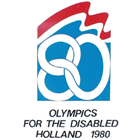The 1980 Summer Paralympics (Dutch: Paralympische Zomerspelen 1980), branded as the Olympics for the Disabled, were the sixth Summer Paralympic Games. They were held in Arnhem, Netherlands, from 21 to 30 June 1980.
 | |
| Location | Arnhem, Netherlands |
|---|---|
| Nations | 42 |
| Athletes | 1,973 |
| Events | 489 in 12 sports |
| Opening | 21 June |
| Closing | 30 June |
| Opened by | |
| Stadium | National Sports Centre Papendal |
Summer Winter
1980 Summer Olympics | |
Background
editThe Soviet Union, hosts of the 1980 Summer Olympics, were invited to host these Paralympics. However, disability sport was not there, and they passed; notoriously, a statement was issued denying the existence of any disabled people in the country (labelled "invalids" by Soviet officials).[1][2] Soviet Paralympic teams were first represented in the 1988 Summer and Winter Games, also the last while the Soviet Union was extant. The first Paralympics on former Soviet territory would be in 2014.[3]
There was controversy during the preparation for these Games over the inclusion of a team from South Africa. In the Netherlands, public and official opinion was against the inclusion of the South African team and pressure came from a number of sports organisations against the Organising Committee. The Dutch Parliament was negative as well. Eventually, the parliament decided against allowing the participation of the South African team. Although "much of the publicity relating to the South African participation had been negative, it did succeed in bringing the disabled sports movement into the minds of many people who would not have otherwise considered the subject at all. Dutch organisers also increased visibility through their fundraising ... building a fund that would hold a surplus years after the games. This would naturally find its expression in the International Fund Sport Disabled, supporting the future of the paralympic movement in the 1980s."[4]
Mascots
editThe 1980 Paralympics were the first ever to have mascots: a pair of squirrels, Noggi and Joggi, designed by Necky Oprinsen from Sint-Michielsgestel. They were chosen through a design competition by Dutch broadcaster AVRO.[5]
Sports
editCompetitors were divided into four disability categories: amputee, cerebral palsy, visually impaired, and wheelchair. It was the first time that cerebral palsy athletes competed in the Paralympics. Volleyball was added to the program as a new sport.[6]
Participating delegations
editForty-three delegations took part in the Arnhem Paralympics. Iceland, Kuwait and Sudan made their first appearances.[7]
Prior to the Games, the States General (national Parliament) of the Netherlands, as host country, adopted a motion declaring South Africa's participation "undesirable", due to its policy of apartheid. The 1980 Games thus marked South Africa's first absence from the Summer Paralympics since it had joined the movement in 1964, and it remained absent until 1992. The Netherlands' decision thus corrected the anomaly whereby South Africa had been banned from the Olympic movement since 1960, while still being authorised to take part in the Paralympic Games.[8][9]
- Argentina (11)
- Australia (52)
- Austria (48)
- Bahamas (6)
- Belgium (67)
- Brazil (2)
- Canada (94)
- Colombia (11)
- Czechoslovakia (7)
- Denmark (42)
- Egypt (33)
- Ethiopia (1)
- Finland (60)
- France (97)
- Great Britain (96)
- Greece (7)
- Hong Kong (11)
- Iceland (12)
- Indonesia (15)
- Ireland (23)
- Israel (47)
- Italy (38)
- Jamaica (13)
- Japan (30)
- Kenya (17)
- Kuwait (9)
- Luxembourg (9)
- Malta (8)
- Mexico (27)
- Netherlands (108)
- New Zealand (17)
- Norway (53)
- Poland (80)
- South Korea (12)
- Spain (24)
- Sudan (11)
- Sweden (94)
- Switzerland (65)
- United States (132)
- West Germany (128)
- Yugoslavia (31)
- Zimbabwe (5)
Medal table
editThe top 10 NPCs by number of gold medals are listed below. The host nation, Netherlands, is highlighted.
| Rank | Nation | Gold | Silver | Bronze | Total |
|---|---|---|---|---|---|
| 1 | United States | 75 | 66 | 54 | 195 |
| 2 | Poland | 75 | 50 | 52 | 177 |
| 3 | West Germany | 68 | 48 | 46 | 162 |
| 4 | Canada | 64 | 35 | 31 | 130 |
| 5 | Great Britain | 47 | 32 | 21 | 100 |
| 6 | Netherlands* | 33 | 31 | 36 | 100 |
| 7 | Sweden | 31 | 36 | 24 | 91 |
| 8 | France | 28 | 26 | 31 | 85 |
| 9 | Mexico | 20 | 16 | 6 | 42 |
| 10 | Norway | 15 | 13 | 8 | 36 |
| Totals (10 entries) | 456 | 353 | 309 | 1,118 | |
See also
editReferences
edit- ^ Phillips, Sarah D. (2009). ""There Are No Invalids in the USSR!" A Missing Soviet Chapter in the New Disability History". Disability Studies Quarterly. 29 (3). doi:10.18061/dsq.v29i3.936.
- ^ "Russia's journey from "no invalids" to Paralympic champions". Rbth.com. 14 November 2013. Retrieved 30 October 2015.
- ^ "Sochi 2014 Paralympics: IPC confident on venue accessibility". BBC Sport. Retrieved 3 March 2014.
- ^ Bailey, Steve (2008). Athlete First: A history of the paralympic movement. John Wiley & Sons. pp. 38–39. ISBN 9780470058244.
- ^ ""Arnheim 1980 – Paralympic Mascots "Noggi and Joggi". Theolympicdesign. Retrieved 24 August 2024.
- ^ "Arnhem 1980". International Paralympic Committee. 2008. Retrieved 6 August 2008.
- ^ "Medal Standings – Arnhem 1980 Paralympic Games". International Paralympic Committee. 2008. Retrieved 8 August 2008.
- ^ "'The Netherlands against Apartheid' – 1970s", International Institute of Social History
- ^ South Africa at the Paralympics, International Paralympic Committee